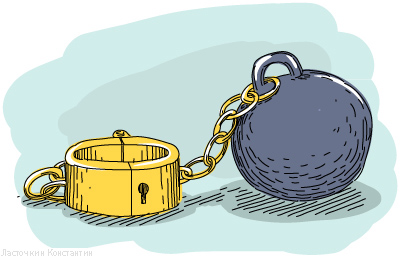Freelance - practice. 4 years later
4 years ago I discovered the concept of "freelancing" and described the impressions in the article: habrahabr.ru/post/53938
I think it makes sense to share the latest observations.
During this time there were no weighty arguments for accepting proposals from offices. Meshala base of loyal customers, even if they apply once a year. It developed a sense of financial stability. Calm, independence from other people's decisions.
')
The portfolio has grown, some of whose work has already been forgotten. Had the skills to communicate and work with clients and freelance assistants.
Became more mobile. There was a laptop for travel, a smartphone with unlimited communication for efficiency. This text is typed on the road on a smartphone through an online document service.

For a long time I tried not to associate my real name with the status of a freelancer. First, the term overgrown with negative. Most often, he is perceived as “a cheap worker, ready for anything at any time of the day . ” As well as possible, this characterizes the overheard phrase: “Do you do expensive websites or freelance?” . Agree, not the best feature for self-respecting professional.
Secondly, I was constantly hampered by the very contradiction of the essence of the phenomenon and the widespread image. In essence, a freelancer is a specialist with private practice. Sells your work time without the mediation of the organization. A good alternative to an employee on a salary, tasks for which are rare. It has the objectives, goals and habitat of a normal “adult business”.
But the Internet and the needs of the masses gave rise to new definitions for it:
• A good option to start a career from scratch or with minimal skills.
• work at home, via the Internet
• “leftists” at work, also via the Internet
• source of cheap, “seasonal” slave. strength
• and completely absurd - work through freelance exchanges
In part, this approach is due to the Internet environment itself, whose age composition is still represented by a mass of young people. Often, its participants do not have a primary education or a student job. The lack of jobs in the province is replenishing the ranks of freelancers with newcomers to the profession. Again, women who have gone on maternity leave try their hand at design or copywriting.

Following the needs of the masses, freelance exchanges (the main sources of orders for ordinary freelancers) adhere to very specific images in advertising and their positioning. Work at any time of the day, you can sleep before lunch. Working in pajamas in the kitchen, stirring porridge in between things. On the beach (favorite image), in a cafe. In general, the complete absence of hateful discipline and restrictions. And they promise to the customer “quickly and cheaply”.
The choice of this strategy is clear. It is more convenient to work with this material than with entrepreneurs who are not satisfied with obtaining only the right to work in underwear, at home, at night. Give them a serious client, guarantees, business tools, returns.
I do not want to say that all freelancers are schoolchildren and, obscenely, cheap slaves with whom you can do anything. Moreover, there are real freelancing giants whose names are well known, and no one will suspect they have low budgets. But, customers are used to seeing penny slaves. And it is this stereotype that will ruin the life of today's students. Will put a restrictive bar in the future.
So the government created a “law on freelancers”, confusing the notions of “homeworker” and a specialist with “private practice”, an entrepreneur. And the difference is significant. If the former simply works at home, being in the employer's staff, the latter is the “employer to himself”.
Once an expert freelancer labels himself, he often forgets his entrepreneurial identity. He forgets that his goal was independence from bosses, making active decisions in his career, the ability to choose what to do. Financial independence and personal enrichment, after all. “Do not work for uncle”. And it all comes down to work from home or from the seashore (the main thing is not in the office). Too often, emphasis is placed on Free - free from the schedule, free from obligations, free from laws, free from boring bureaucracy, free from red tape, free from rules ... Flibustier with a monkey on his shoulder.
It is worth returning to the origins of the term. Yes, "free spearman", but all his freedom was freedom from the master. A mercenary without a lord. He himself cared about the “working inventory”, treatment, about his preparation, searching for clients, selling services, getting in touch with the law. There were no shades of pirating criminal and carefree brothers in this word.
Business advises to be active, keep abreast and control your position yourself. "Do not put eggs in one basket." Search for new markets, new ways. Be prepared, look ahead.
Frankly, I myself fell into a trap of calm. Portfolio posted on a third-party resource, freelance exchange. From there goes enough orders, inexpensive and effective advertising. You start to perceive the link to your account as a full-fledged analogue of your personal site and even enter it into a business card. By this you make yourself dependent on someone else's will. Well, that did not succumb to the influence of snobs and developed accounts in social networks, which gave at least minimal indexing in search engines.

Another mistake - limiting sources of orders. Back in the last article, I singled out for myself one freelance exchange and developed an account there, ignoring competing resources. It is worth actively developing several accounts on the main freelance exchanges, including foreign ones, and searching for orders through a personal page. The former will respond with an increase in reputation, the latter will provide greater independence from services in the event of a radical change of policy on them or even the closure of a resource.

Generally, than to study professions alien to you, it is better to cooperate with the appropriate experts. For example, it is not enough to be able to reduce and cast a voice acting on a video. A good specialist knows where to find the necessary samples and ensure their legality, has a base of actors. And I personally do not want to do this. For good, the search and communication with customers should also be given to a specialist ... But this is all individually. Someone is not averse to chat himself.

Yes, theoretically, any client can come to freelancing. But in practice, big business there is a rare guest. Those companies with which I work, once came to freelancing for a unique service for them, or because their specialists are overloaded. Sometimes serious customers are looking for new participants for competitions held outside the stock exchange.
But the freelancing market itself is not particularly friendly to serious budgets. Managers of organizations are faced with crowds of non-professional workers, often unable to adequately assess labor costs. People who have no experience with such clients. Freelancers without negotiation skills can not smooth out the customer's natural illiteracy in the subject of development, technology. Many who want to work have problems with the legalization of transactions. And this is all with the universal glory of freelancers as “overly free,” “going to hospital” for any complication in the project.
However, budgets are possible quite serious. But their percentage is very small. But who said that “$ 5,000 without straining” should be for everyone? If we talk about freelance exchanges, then there is an opinion that customers are representatives of small business, less often medium with rare inclusions of really serious companies.

By the way, about communicating with customers. It is best to learn to be polite, to exclude jargon from speech, to work on the style and literacy of speech. Speak in voice comes often enough. I was simplified by the transition to the “universal you”. It simplifies communication. No need to remember and raise the correspondence, figuring out how to contact a person during an urgent call.
In a specialist company, the manager protects the client from anger. The freelancer is deprived of this buffer, and should be able to communicate with problem clients, requiring reasoned conviction, calm, attentive explanation. Periodically it is useful to study materials on "oratory" and negotiating. Sometimes you just need to say correctly: “I know how to do it. Everything will be fine . " You need to have an opinion and be able to convey it.
It is extremely important to keep track of customers, make up the base. I advise you to record the company, contact persons, all contacts, record what projects were carried out by date, brief impressions for yourself and the cost of work. This information can simplify communication in the future. For this, the tabular format of exel documents is perfect.
To tell you the truth, my attitude to the calculation of the budget has not changed much during this time. I consider it important to calculate the cost of a specialist’s hour of work, including all components: taxes, sick-lists, development, etc. With this figure, you need to take a sober approach to the required development time, laying at least 20% on top (without which never happens) . There should not be numbers “out of thin air”, this is not respectful towards the client, and stupid towards oneself. Even the most “standard” project, as a result, can greatly deviate from standard numbers at times.
Many people complain about low budgets and customer greed. Very often this happens because of a failure to understand this area of activity by the client. I advise you not to hesitate to call the client the price for which you will be comfortable working. And in general, to make it a habit to ignore other people's offers and initial, not infrequently low, budgets from the customer. Perhaps there are objective reasons for such an understatement. But it is better to start communicating the designation of real boundaries.

Perhaps I will highlight this item. I will not say that I invested very big big money in promotion. The required minimum. As a rule, it was the purchase of a special status and rare additional services on specialized resources. Perhaps I had enough variety of work in the portfolio. They only needed to be highlighted. But I was never lazy to learn new projects on the stock exchanges. I did not hope only that the client should come himself.
Very often I hear, from the same lovers of “freedom and everything free in the network”, that the monetization of services is evil, and in general a freelancer should not pay for anything. As before, I consider it a delusion. Develop your website, studio, account on the stock exchange - investment in advertising increases revenue. With the right approach in proportion. If someone brings you customers - it is worth encouraging. The main thing is to bring further. So, you need to pay for the “GOLD-account” and for advertising.
At least for the “pure freelancer”, there should be no doubt about the “financial boosting”. Affirming the opposite, most often, simply combine freelancing with the office, and they only need one project in 2-3 months. After all, it is on the salary that the idea is instilled in a person that paying for the opportunity to work is a crime. An overloaded freelancer will always find additional resources in the form of team-mates, and this will advance in the development of his business.
Even if loaded for a couple of months in advance, there is a habit of monitoring and discussing possible orders for the future. It's easy enough to get into a situation where, after a completed order, you are out of work for a couple of weeks, just because you relax. And negotiations on the start of a new project can go half a year.
At the very beginning, I often fixed my schedule immediately after the start of negotiations, having only indicative dates for the project. Even could refuse to the new client, referring to employment in the near future. But later there was an understanding that the project becomes real only after a formal start in the form of a prepayment and a signature in the contract. Most often, out of two or three discussed projects, one works.

Different experts develop different ways to protect against unfair customer behavior. It can be expressed in attempts to steal the work, in endless edits and simple: “you know, we decided to stop everything, sorry to bother you”. But in my experience I will say - even the contract works better if the client makes an advance payment. And old friendship is not a guarantee of decency. Once he was "thrown" by the customer, with whom he worked fruitfully for 2 years.
My personal preference is 50% prepayment. This allows us to weed out lovers of “freebies”, to start the mechanism of personal interest and does not allow the client to jump halfway through. The introduction of the “always take a prepayment” rule nullified the losses due to the bad faith of some customers, but did not scare away serious customers. And in the first year of work on freelancing the amount of such losses was stable and planned.
And the question here is not how to take a prepayment, but whether you want to be deceived in the future? If a person refuses to give a prepayment, more often than not, he does not want to pay in principle. Collection of ideas, free layouts and hidden tenders flourish at different levels of the market.
Immediately I’m ahead of a possible question - if the work has begun, and it has been made at least a quarter, I don’t return the prepayment in case of a simple closure of the project. The customer must also be disciplined and respect the time allocated for the project. But such cases can be counted on the fingers.
All kinds of "secure transaction services" are not used. I think this is redundant for people who can meet, sign a contract and start with a prepayment. But I consider them quite acceptable measure for a certain group of customers and beginner freelancers.

The schedule, in my opinion, for working on oneself is more important than for working for wages. It allows you to win laziness associated with the sea of freedom, like “I’ll rather go reading than to type out this boring model”.
It is important to understand that realistically, the average person cannot concentrate work 4 hours a day. And if by the beginning of these 4 hours you already get tired of other things, the work will be less fruitful. It is necessary to properly distribute this effective time.
Not a supporter of the fact that during work you need to turn off everything that can distract. But you need to distract yourself consciously, highlighting specific intervals in your schedule. It will take two or three hours to negotiate, study potential projects. It is important to find time and just for breaks once an hour.
Time tracking allows you to monitor the "consumption of resources" - working time. The task should not be solved longer than planned. Delays are quite specific money.
For the task of monitoring the schedule, there are many programs and services. But I prefer to use a Google calendar or even just a sheet of paper in which all actions are recorded with fixing the time spent. Online document services are accessible from any machine, even from a smartphone. The simpler they are, the less confusion arises. And specialized services are tied to themselves and the platform. A text file in the dropbox folder is also suitable.
Constant mode is important not only for self-organization. It is also needed for the convenience of customers. Your personal preferences for the time of day for work, customers are even less interesting than the heads of offices. Of course, if you reach the level of a “world scale guru,” any of your antics will endure. And before that, you will have to think about the convenience of the customer, who is comfortable with you at 10:00 to clarify the status of the project, and after lunch, check out the developments. It is enough to blush a couple of times because of a freelance workmate who only makes changes at night, as you begin to respect the working day. The exception is working with a big difference in time zones.
And also health. It is impossible to work effectively for too long when the graph is down. Plus, no one guarantees that at any time your client will not have an emergency situation and “it was necessary yesterday — I pay as much as you want!” .

In addition, family people will agree that relatives will hang all your household chores at your earliest convenience, because you are “at home”. For this, it is necessary that for you and for them there should be the concept of “working day”, which cannot be changed at the first whim.
I often have to work with the time zone difference of + -3 hours, and I try to fit into the schedule 10: 00-19: 00. In recent years, learned to appreciate the weekend. Although I can afford to relax in the middle of the week, my relatives, friends and acquaintances often work at this time. Yes, and customers on weekends rarely get in touch, which makes the rest quieter.

Whatever you say, and the workplace must be equipped. I don’t presume to say how it happens in different specialties, but my experience suggests that it’s important to have a separate room for work, from which you can drive everyone out to work. And of course, do not work where you eat or sleep. It knocks off the working rhythm, throws up the very temptations that people are afraid of at work at home. Need an office room or office.
I did not find the technical balance to work from anywhere. Perhaps this is the specificity of the profession, but I work with a laptop on my knees only on trips.
Over the years, freelancing only confirmed in the opinion that the "freelancer half-breed" is a disaster for both the employer and the customer. At one he does not give all the best for 100%, since he manages to work on the side. And the customer always runs the risk of being “burned out”. The most amazing thing is that you have to explain this to HR managers.
Yes, there will be successful exceptions, but most often I had to deal with problems when another “freelancer” could not do its job quickly, because “at work was an alright . ”

As before, I do not think that freelancing is a great place to start a career. As an exception - in the hometown there is no work at all. In the Russian reality, unfortunately, this is still relevant. If there is work, you should not immediately rush headlong into the abyss of freelancing. There are a lot of risks, because: “entrepreneurial activity is an independent economic activity at its own risk, aimed at systematically making a profit” (Wikipedia). There are much more chances to be cheated on freelancing than in an organization. And if you are afraid of an interview with the expectation of years, how will you sell your services every day? Nobody guarantees you a stable income, sick leave and vacation. No one guarantees that you will not stay in the red. Find a suitable company, work as an apprentice.
Often in the thematic forums there are flashes of questions: “what do you advise a freelance beginner to start with?” . My answer is to ask yourself, who needs you? What can you do? If this question causes difficulties, then it is better not to linger “here”.

I perfectly understand that a lot of things come into conflict with an ordinary way of a freelancer working anytime and anywhere, getting up at 12:00, working in a park. And it can cause some controversy. But is the goal just to get up later and work anywhere?
A slightly more serious approach than is expected from the “free spearmen” allowed me personally to find stability and comfort. I can only advise all beginners, from the first steps on freelancing, to stop considering themselves as “freelancers”. Take an active position, more control over your life and activities. Despite all the difficulties, self-employment (freelancing) for a specialist can be at least a good substitute for an office.
At the moment, I have taken into account errors, a simple personal page was collected. Let it be temporary with links to the portfolio on third-party sites. Purchased advertising. Learning ways to promote. Accounts are actively rising on various freelance exchanges, including the acclaimed "freelance". I study thematic social networks with business contacts. Looking for more connections with advertising agencies. Although it is customary to dislike them, agencies are the most active regular customers. The desire to create a truly "own business" is growing stronger.
We'll see. Perhaps in a couple of years there will finally be an article "From freelancing to the studio."
I think it makes sense to share the latest observations.

A brief sketch of today's day
During this time there were no weighty arguments for accepting proposals from offices. Meshala base of loyal customers, even if they apply once a year. It developed a sense of financial stability. Calm, independence from other people's decisions.
')
The portfolio has grown, some of whose work has already been forgotten. Had the skills to communicate and work with clients and freelance assistants.
Became more mobile. There was a laptop for travel, a smartphone with unlimited communication for efficiency. This text is typed on the road on a smartphone through an online document service.

What is a “freelancer”?
For a long time I tried not to associate my real name with the status of a freelancer. First, the term overgrown with negative. Most often, he is perceived as “a cheap worker, ready for anything at any time of the day . ” As well as possible, this characterizes the overheard phrase: “Do you do expensive websites or freelance?” . Agree, not the best feature for self-respecting professional.
Secondly, I was constantly hampered by the very contradiction of the essence of the phenomenon and the widespread image. In essence, a freelancer is a specialist with private practice. Sells your work time without the mediation of the organization. A good alternative to an employee on a salary, tasks for which are rare. It has the objectives, goals and habitat of a normal “adult business”.
But the Internet and the needs of the masses gave rise to new definitions for it:
• A good option to start a career from scratch or with minimal skills.
• work at home, via the Internet
• “leftists” at work, also via the Internet
• source of cheap, “seasonal” slave. strength
• and completely absurd - work through freelance exchanges
In part, this approach is due to the Internet environment itself, whose age composition is still represented by a mass of young people. Often, its participants do not have a primary education or a student job. The lack of jobs in the province is replenishing the ranks of freelancers with newcomers to the profession. Again, women who have gone on maternity leave try their hand at design or copywriting.

Following the needs of the masses, freelance exchanges (the main sources of orders for ordinary freelancers) adhere to very specific images in advertising and their positioning. Work at any time of the day, you can sleep before lunch. Working in pajamas in the kitchen, stirring porridge in between things. On the beach (favorite image), in a cafe. In general, the complete absence of hateful discipline and restrictions. And they promise to the customer “quickly and cheaply”.
The choice of this strategy is clear. It is more convenient to work with this material than with entrepreneurs who are not satisfied with obtaining only the right to work in underwear, at home, at night. Give them a serious client, guarantees, business tools, returns.
I do not want to say that all freelancers are schoolchildren and, obscenely, cheap slaves with whom you can do anything. Moreover, there are real freelancing giants whose names are well known, and no one will suspect they have low budgets. But, customers are used to seeing penny slaves. And it is this stereotype that will ruin the life of today's students. Will put a restrictive bar in the future.
So the government created a “law on freelancers”, confusing the notions of “homeworker” and a specialist with “private practice”, an entrepreneur. And the difference is significant. If the former simply works at home, being in the employer's staff, the latter is the “employer to himself”.
We are not a business, we are a freelance! ..?
Once an expert freelancer labels himself, he often forgets his entrepreneurial identity. He forgets that his goal was independence from bosses, making active decisions in his career, the ability to choose what to do. Financial independence and personal enrichment, after all. “Do not work for uncle”. And it all comes down to work from home or from the seashore (the main thing is not in the office). Too often, emphasis is placed on Free - free from the schedule, free from obligations, free from laws, free from boring bureaucracy, free from red tape, free from rules ... Flibustier with a monkey on his shoulder.
It is worth returning to the origins of the term. Yes, "free spearman", but all his freedom was freedom from the master. A mercenary without a lord. He himself cared about the “working inventory”, treatment, about his preparation, searching for clients, selling services, getting in touch with the law. There were no shades of pirating criminal and carefree brothers in this word.
Business advises to be active, keep abreast and control your position yourself. "Do not put eggs in one basket." Search for new markets, new ways. Be prepared, look ahead.
Frankly, I myself fell into a trap of calm. Portfolio posted on a third-party resource, freelance exchange. From there goes enough orders, inexpensive and effective advertising. You start to perceive the link to your account as a full-fledged analogue of your personal site and even enter it into a business card. By this you make yourself dependent on someone else's will. Well, that did not succumb to the influence of snobs and developed accounts in social networks, which gave at least minimal indexing in search engines.

Another mistake - limiting sources of orders. Back in the last article, I singled out for myself one freelance exchange and developed an account there, ignoring competing resources. It is worth actively developing several accounts on the main freelance exchanges, including foreign ones, and searching for orders through a personal page. The former will respond with an increase in reputation, the latter will provide greater independence from services in the event of a radical change of policy on them or even the closure of a resource.

Delegation
Generally, than to study professions alien to you, it is better to cooperate with the appropriate experts. For example, it is not enough to be able to reduce and cast a voice acting on a video. A good specialist knows where to find the necessary samples and ensure their legality, has a base of actors. And I personally do not want to do this. For good, the search and communication with customers should also be given to a specialist ... But this is all individually. Someone is not averse to chat himself.

Freelance clients
Yes, theoretically, any client can come to freelancing. But in practice, big business there is a rare guest. Those companies with which I work, once came to freelancing for a unique service for them, or because their specialists are overloaded. Sometimes serious customers are looking for new participants for competitions held outside the stock exchange.
But the freelancing market itself is not particularly friendly to serious budgets. Managers of organizations are faced with crowds of non-professional workers, often unable to adequately assess labor costs. People who have no experience with such clients. Freelancers without negotiation skills can not smooth out the customer's natural illiteracy in the subject of development, technology. Many who want to work have problems with the legalization of transactions. And this is all with the universal glory of freelancers as “overly free,” “going to hospital” for any complication in the project.
However, budgets are possible quite serious. But their percentage is very small. But who said that “$ 5,000 without straining” should be for everyone? If we talk about freelance exchanges, then there is an opinion that customers are representatives of small business, less often medium with rare inclusions of really serious companies.

Customer service
By the way, about communicating with customers. It is best to learn to be polite, to exclude jargon from speech, to work on the style and literacy of speech. Speak in voice comes often enough. I was simplified by the transition to the “universal you”. It simplifies communication. No need to remember and raise the correspondence, figuring out how to contact a person during an urgent call.
In a specialist company, the manager protects the client from anger. The freelancer is deprived of this buffer, and should be able to communicate with problem clients, requiring reasoned conviction, calm, attentive explanation. Periodically it is useful to study materials on "oratory" and negotiating. Sometimes you just need to say correctly: “I know how to do it. Everything will be fine . " You need to have an opinion and be able to convey it.
It is extremely important to keep track of customers, make up the base. I advise you to record the company, contact persons, all contacts, record what projects were carried out by date, brief impressions for yourself and the cost of work. This information can simplify communication in the future. For this, the tabular format of exel documents is perfect.
Project's budget
To tell you the truth, my attitude to the calculation of the budget has not changed much during this time. I consider it important to calculate the cost of a specialist’s hour of work, including all components: taxes, sick-lists, development, etc. With this figure, you need to take a sober approach to the required development time, laying at least 20% on top (without which never happens) . There should not be numbers “out of thin air”, this is not respectful towards the client, and stupid towards oneself. Even the most “standard” project, as a result, can greatly deviate from standard numbers at times.
Many people complain about low budgets and customer greed. Very often this happens because of a failure to understand this area of activity by the client. I advise you not to hesitate to call the client the price for which you will be comfortable working. And in general, to make it a habit to ignore other people's offers and initial, not infrequently low, budgets from the customer. Perhaps there are objective reasons for such an understatement. But it is better to start communicating the designation of real boundaries.

Attachments
Perhaps I will highlight this item. I will not say that I invested very big big money in promotion. The required minimum. As a rule, it was the purchase of a special status and rare additional services on specialized resources. Perhaps I had enough variety of work in the portfolio. They only needed to be highlighted. But I was never lazy to learn new projects on the stock exchanges. I did not hope only that the client should come himself.
Very often I hear, from the same lovers of “freedom and everything free in the network”, that the monetization of services is evil, and in general a freelancer should not pay for anything. As before, I consider it a delusion. Develop your website, studio, account on the stock exchange - investment in advertising increases revenue. With the right approach in proportion. If someone brings you customers - it is worth encouraging. The main thing is to bring further. So, you need to pay for the “GOLD-account” and for advertising.
At least for the “pure freelancer”, there should be no doubt about the “financial boosting”. Affirming the opposite, most often, simply combine freelancing with the office, and they only need one project in 2-3 months. After all, it is on the salary that the idea is instilled in a person that paying for the opportunity to work is a crime. An overloaded freelancer will always find additional resources in the form of team-mates, and this will advance in the development of his business.
Active search
Even if loaded for a couple of months in advance, there is a habit of monitoring and discussing possible orders for the future. It's easy enough to get into a situation where, after a completed order, you are out of work for a couple of weeks, just because you relax. And negotiations on the start of a new project can go half a year.
At the very beginning, I often fixed my schedule immediately after the start of negotiations, having only indicative dates for the project. Even could refuse to the new client, referring to employment in the near future. But later there was an understanding that the project becomes real only after a formal start in the form of a prepayment and a signature in the contract. Most often, out of two or three discussed projects, one works.

Security
Different experts develop different ways to protect against unfair customer behavior. It can be expressed in attempts to steal the work, in endless edits and simple: “you know, we decided to stop everything, sorry to bother you”. But in my experience I will say - even the contract works better if the client makes an advance payment. And old friendship is not a guarantee of decency. Once he was "thrown" by the customer, with whom he worked fruitfully for 2 years.
My personal preference is 50% prepayment. This allows us to weed out lovers of “freebies”, to start the mechanism of personal interest and does not allow the client to jump halfway through. The introduction of the “always take a prepayment” rule nullified the losses due to the bad faith of some customers, but did not scare away serious customers. And in the first year of work on freelancing the amount of such losses was stable and planned.
And the question here is not how to take a prepayment, but whether you want to be deceived in the future? If a person refuses to give a prepayment, more often than not, he does not want to pay in principle. Collection of ideas, free layouts and hidden tenders flourish at different levels of the market.
Immediately I’m ahead of a possible question - if the work has begun, and it has been made at least a quarter, I don’t return the prepayment in case of a simple closure of the project. The customer must also be disciplined and respect the time allocated for the project. But such cases can be counted on the fingers.
All kinds of "secure transaction services" are not used. I think this is redundant for people who can meet, sign a contract and start with a prepayment. But I consider them quite acceptable measure for a certain group of customers and beginner freelancers.

Schedule and time tracking
The schedule, in my opinion, for working on oneself is more important than for working for wages. It allows you to win laziness associated with the sea of freedom, like “I’ll rather go reading than to type out this boring model”.
It is important to understand that realistically, the average person cannot concentrate work 4 hours a day. And if by the beginning of these 4 hours you already get tired of other things, the work will be less fruitful. It is necessary to properly distribute this effective time.
Not a supporter of the fact that during work you need to turn off everything that can distract. But you need to distract yourself consciously, highlighting specific intervals in your schedule. It will take two or three hours to negotiate, study potential projects. It is important to find time and just for breaks once an hour.
Time tracking allows you to monitor the "consumption of resources" - working time. The task should not be solved longer than planned. Delays are quite specific money.
For the task of monitoring the schedule, there are many programs and services. But I prefer to use a Google calendar or even just a sheet of paper in which all actions are recorded with fixing the time spent. Online document services are accessible from any machine, even from a smartphone. The simpler they are, the less confusion arises. And specialized services are tied to themselves and the platform. A text file in the dropbox folder is also suitable.
Constant mode is important not only for self-organization. It is also needed for the convenience of customers. Your personal preferences for the time of day for work, customers are even less interesting than the heads of offices. Of course, if you reach the level of a “world scale guru,” any of your antics will endure. And before that, you will have to think about the convenience of the customer, who is comfortable with you at 10:00 to clarify the status of the project, and after lunch, check out the developments. It is enough to blush a couple of times because of a freelance workmate who only makes changes at night, as you begin to respect the working day. The exception is working with a big difference in time zones.
And also health. It is impossible to work effectively for too long when the graph is down. Plus, no one guarantees that at any time your client will not have an emergency situation and “it was necessary yesterday — I pay as much as you want!” .

In addition, family people will agree that relatives will hang all your household chores at your earliest convenience, because you are “at home”. For this, it is necessary that for you and for them there should be the concept of “working day”, which cannot be changed at the first whim.
I often have to work with the time zone difference of + -3 hours, and I try to fit into the schedule 10: 00-19: 00. In recent years, learned to appreciate the weekend. Although I can afford to relax in the middle of the week, my relatives, friends and acquaintances often work at this time. Yes, and customers on weekends rarely get in touch, which makes the rest quieter.

Workplace
Whatever you say, and the workplace must be equipped. I don’t presume to say how it happens in different specialties, but my experience suggests that it’s important to have a separate room for work, from which you can drive everyone out to work. And of course, do not work where you eat or sleep. It knocks off the working rhythm, throws up the very temptations that people are afraid of at work at home. Need an office room or office.
I did not find the technical balance to work from anywhere. Perhaps this is the specificity of the profession, but I work with a laptop on my knees only on trips.
Combination with office
Over the years, freelancing only confirmed in the opinion that the "freelancer half-breed" is a disaster for both the employer and the customer. At one he does not give all the best for 100%, since he manages to work on the side. And the customer always runs the risk of being “burned out”. The most amazing thing is that you have to explain this to HR managers.
Yes, there will be successful exceptions, but most often I had to deal with problems when another “freelancer” could not do its job quickly, because “at work was an alright . ”

Skills, professionalism
As before, I do not think that freelancing is a great place to start a career. As an exception - in the hometown there is no work at all. In the Russian reality, unfortunately, this is still relevant. If there is work, you should not immediately rush headlong into the abyss of freelancing. There are a lot of risks, because: “entrepreneurial activity is an independent economic activity at its own risk, aimed at systematically making a profit” (Wikipedia). There are much more chances to be cheated on freelancing than in an organization. And if you are afraid of an interview with the expectation of years, how will you sell your services every day? Nobody guarantees you a stable income, sick leave and vacation. No one guarantees that you will not stay in the red. Find a suitable company, work as an apprentice.
Often in the thematic forums there are flashes of questions: “what do you advise a freelance beginner to start with?” . My answer is to ask yourself, who needs you? What can you do? If this question causes difficulties, then it is better not to linger “here”.

As a conclusion
I perfectly understand that a lot of things come into conflict with an ordinary way of a freelancer working anytime and anywhere, getting up at 12:00, working in a park. And it can cause some controversy. But is the goal just to get up later and work anywhere?
A slightly more serious approach than is expected from the “free spearmen” allowed me personally to find stability and comfort. I can only advise all beginners, from the first steps on freelancing, to stop considering themselves as “freelancers”. Take an active position, more control over your life and activities. Despite all the difficulties, self-employment (freelancing) for a specialist can be at least a good substitute for an office.
At the moment, I have taken into account errors, a simple personal page was collected. Let it be temporary with links to the portfolio on third-party sites. Purchased advertising. Learning ways to promote. Accounts are actively rising on various freelance exchanges, including the acclaimed "freelance". I study thematic social networks with business contacts. Looking for more connections with advertising agencies. Although it is customary to dislike them, agencies are the most active regular customers. The desire to create a truly "own business" is growing stronger.
We'll see. Perhaps in a couple of years there will finally be an article "From freelancing to the studio."
Source: https://habr.com/ru/post/160205/
All Articles